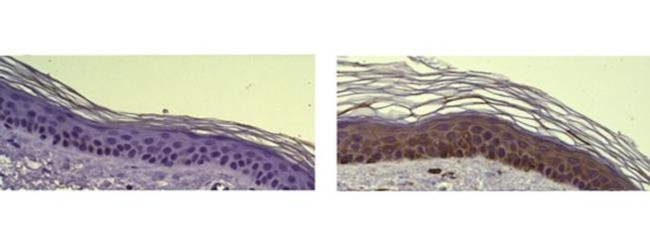Search Thermo Fisher Scientific
Invitrogen
Cytokeratin 6 Monoclonal Antibody (LL020), eBioscience™
FIGURE: 1 / 1
Cytokeratin 6 Antibody (14-9788-82) in IHC (P)

Product Details
14-9788-82
Species Reactivity
Host/Isotype
Class
Type
Clone
Conjugate
Form
Concentration
Purification
Storage buffer
Contains
Storage conditions
Shipping conditions
RRID
Product Specific Information
Description: The monoclonal antibody LL020 recognizes human Cytokeratin 6. Cytokeratins are intermediate filament proteins comprising one component of the cytoskeleton. Cytokeratin 6 is a type II (basic) keratin that associates with Cytokeratin 16 and Cytokeratin 17. Cytokeratin 6 is expressed in the epidermis, outer root sheath of hair follicles, oral mucosa, suprabasal cells of stratified epithelia, and glandular epithelia. Gene mutations result in inherited skin and hair disorders. Some reports suggest that LL020 may have some crossreactivity to Cytokeratin 5.
Applications Reported: This LL020 antibody has been reported for use in western blotting, immunohistochemical staining of formalin-fixed paraffin embedded tissue sections, microscopy, immunohistochemical staining, and ELISA.
Applications Tested: This LL020 antibody has been tested by immunohistochemistry on formalin-fixed paraffin embedded human tissue using low pH antigen retrieval and can be used at less than or equal to 10 µg/mL. It is recommended that the antibody be carefully titrated for optimal performance in the assay of interest.
Purity: Greater than 90%, as determined by SDS-PAGE.
Aggregation: Less than 10%, as determined by HPLC.
Filtration: 0.2 µm post-manufacturing filtered.
Target Information
Keratins 6 and 16 are expressed in keratinocytes, which are undergoing rapid turnover in the suprabasal region (also known as hyperproliferation-related keratins). Keratin 6 is found in hair follicles, suprabasal cells of a variety of internal stratified epithelia, in epidermis, in both normal and hyperproliferative situations. Epidermal injury results in activation of keratinocytes which express CK6 and CK16. CK6 is strongly expressed in about 75% of head and neck squamous cell carcinomas. Expression of CK6 is particularly associated with differentiation.
For Research Use Only. Not for use in diagnostic procedures. Not for resale without express authorization.
References (0)
Bioinformatics
Protein Aliases: CK-6A; CK-6B; CK-6C; CK-6D; CK-6E; cytokeratin 6A; cytokeratin 6B; cytokeratin 6C; cytokeratin 6D; Cytokeratin-6A; Cytokeratin-6B; Cytokeratin-6C; Cytokeratin-6D; Cytokeratin-6E; K6A; K6B; K6C; kamp-keratin derived antimicrobial peptide; KDAMP; keratin 6A, , type II; keratin 6A, type II; keratin 6B, type II; keratin 6C, type II; keratin 6E; Keratin K6h; keratin, epidermal type II, K6A; keratin, epidermal, type II, K6B; Keratin, type II cytoskeletal 6A; Keratin, type II cytoskeletal 6B; Keratin, type II cytoskeletal 6C; Keratin-6A; Keratin-6B; Keratin-6C; keratin-like 1 (a type II keratin sequence); Type-II keratin Kb10; Type-II keratin Kb12; Type-II keratin Kb6
Gene Aliases: CK-6B; CK-6C; CK-6E; CK6A; CK6B; CK6C; CK6D; K6A; K6B; K6C; K6D; K6E; KRT6A; KRT6B; KRT6C; KRT6D; KRT6E; KRTL1; PC2; PC3; PC4; PPKNEFD
UniProt ID: (Human) P02538, (Human) P04259, (Human) P48668
Entrez Gene ID: (Human) 3853, (Human) 3854, (Human) 286887

Performance Guarantee
If an Invitrogen™ antibody doesn't perform as described on our website or datasheet,we'll replace the product at no cost to you, or provide you with a credit for a future purchase.*
Learn more
We're here to help
Get expert recommendations for common problems or connect directly with an on staff expert for technical assistance related to applications, equipment and general product use.
Contact tech support
